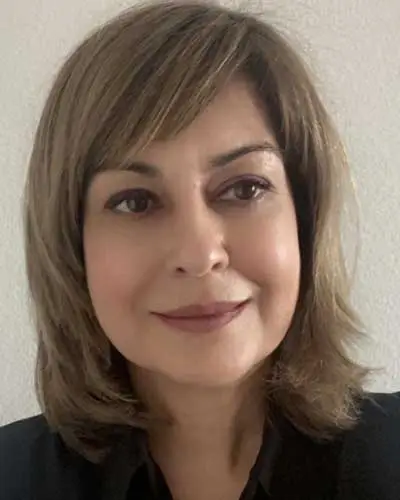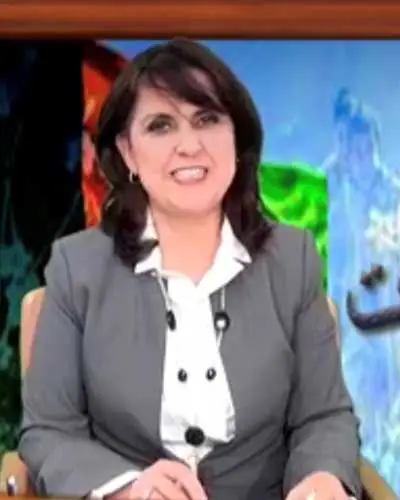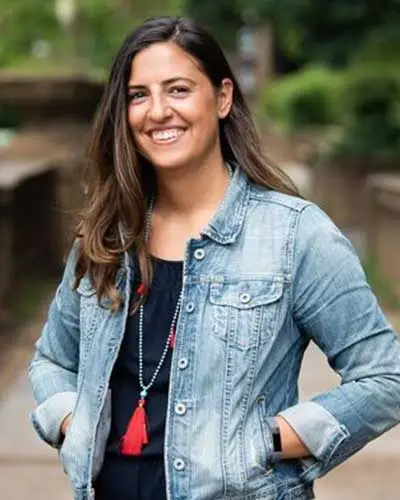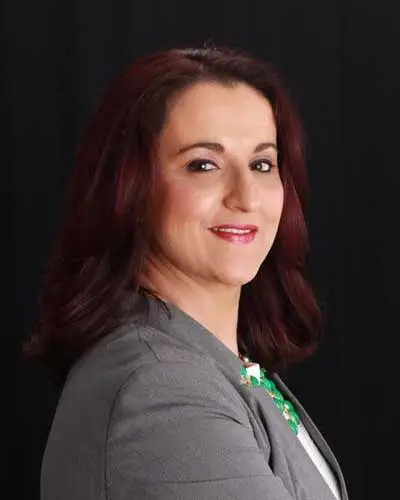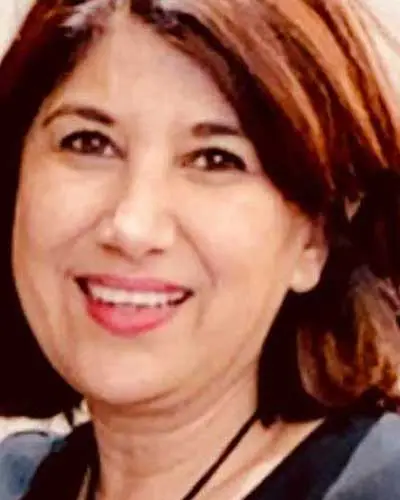About International Orphan Care
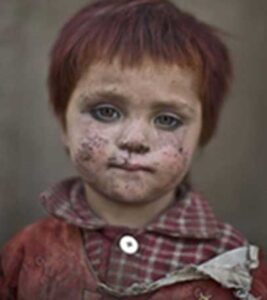
Founded in 1992 and headquartered in Laguna Hills, California, International Orphan Care (IOC) is a nonprofit, non-religious, non-political, and non-sectarian humanitarian organization. The first IOC school was established January 1993 in a rented building in Jalalabad as a vocational school providing work skills to the eldest son of a family whose father was deceased. The goal was to provide the boy with skills that would enable him to contribute financially to the support of the family and allow the younger siblings to attend school.
See what we do!
All contributions to IOC are tax deductible as allowable under federal law. There are many needs and many ways to donate. Please visit the “Donate” page for more information.
Everything you need to know about us:
Mission, Vision and Goals
The mission of IOC is to provide the orphans of Afghanistan with HOPE (Help Orphans be Productive and Educated). IOC gives HOPE by helping to reintegrate children from homes where they are missing a father or a father and mother back into society. IOC provides these children the means to go to school so they can spend their days learning instead of working, begging on the streets or turning to other desperate sources for survival. A simple monthly contribution pays for a child to be clothed especially through the harsh snowy winters in Afghanistan and health care.
PROJECT HOPE reaches orphaned children (ages 5 to 13 years) and teenagers (ages 14 years and older) in Afghanistan; providing them with elementary education, clothing, hygiene, and supplies. Those 14-years and older receive vocational skill training to help with future employment, as well as providing skills for mentoring their younger siblings. IOC also ensures there is time for organized and free play, an important part of child development
Statement of Values
IOC believes that children are the future and strives to positively change the lives of children to be educated and productive members of society. All facets of the organization are focused on this core value. More than half the population in Afghanistan is under the age of nineteen, thus the education and well-being of the Afghan youth is paramount in the development and progress of society.
History
Prior to 1979, the orphan population of Afghanistan was insignificant, primarily because of 60 years of relative peace and no armed conflict. Furthermore, Afghan culture had a tradition in which children who had lost a parent would be taken in by his/her extended family. The imminent wars and armed conflict upset this non-institutional social safety net for the welfare of children. On December 25, 1979, the former Soviet Union invaded Afghanistan setting off a history of sustained conflicts and associated humanitarian crises that exist to this day, most notably the suffering of children.
1979 – 1989: Soviet Occupation
In 1979, the people of Afghanistan declared their determination to resist the Soviet invasion and maintain the dignity instilled so deeply within them by their forefathers. Since that time, they have been injured or have died in a war that belongs to all the free world.
Most of the casualties were women and children. Based on information from the United Nations, one and one-half million people were killed. Over six million are refugees and tens of thousands are permanently disabled. Those numbers were particularly high, when compared with the pre-war population of sixteen million. The remainder of the population has also been directly affected in some way, as they have either lost members of their families or have become orphans.
February 15, 1989, marked the final and complete withdrawal of the Soviet Union’s combatant forces from Afghanistan. The Soviets propped up the communist government of Dr. Najibullah with military support until the fall of the Soviet Union in December 1991. Four months later, the communist Afghan government collapsed and was overrun by Mujahideen forces.
1992 – 1996: Civil War
In April 1992, a transitional government was formed and foreign nongovernmental organizations NGOs began to engage in humanitarian aid and reconstruction projects in Afghanistan. In the summer of 1992, inspired by the liberation of Afghanistan, founding members of IOC traveled to Afghanistan to survey the needs of the people and particularly the children. The aftermath of the Soviet War had left a humanitarian crisis with 700,000 orphans; 1.5 million children who lost a parent; 200,000 survivors of landmine explosions; and a death and injury rate of three hundred civilians per month. The tragic circumstance of the children, especially the dire straits of orphans, was a sobering reality and the driving force for the birth of International Orphan Care, which was established soon after in December 1992.
The Jalalabad Orphan Care Center was established in January 1993. Over three hundred students, girls, and boys, aged 5-17 attended the K-12 and vocational classes. The school provided education and healthcare to orphan children until 1996, when increased hostilities and significant safety and security threats made it impossible to provide aid from abroad and protect the students and the staff at the school.
1996 – 2001: Taliban Rule
In September 1996, the Afghan Taliban established the Islamic Emirate of Afghanistan and effectively curtailed the operations and support of all foreign based NGOs, including IOC. While IOC could not financially or operationally support the IOC school in Jalalabad during Taliban rule, the facility, with local support and donations, did provide shelter and humanitarian aid to the at-risk local population.
2001 to Current
In December 2001, following the overthrow of the Taliban government and the installation of a transitional government, the Board of Directors of IOC reconvened, elected officers, and voted to re-establish the organization and re-engage in Afghanistan. In January 2002, the Kabul Orphan Center was opened on the premises of the Osman family residential compound in Shahr-e-Now and operated until its closing in 2005. In June 2002, the Jalalabad Orphan Center was re-opened and operational and continues to educate children to this day.
In October 2002 and October 2003, IOC partnered with Afghanische Kinderhilfe Deutschland (AKHD) to establish the Dogh Abad and Deh Sabz medical clinics in Kabul. AKHD operates the clinics and KOMAK (Switzerland) collaborates with financial support. Although, IOC did not have the financial resources to continue support after 2009, the two clinics continue to serve the impoverished residents of suburban Kabul. The ambulance, donated by NATO, has saved the lives of hundreds of women and children. NATO has also donated a generator and air conditioning units.
In 2004 the family of Mir Mohammad Youssof donated funds from his estate to construct a vocational school on governmental land. The agreement with the government allows IOC to occupy the site rent free on the condition that the school is operated to provide free vocational education to youth that meet criteria of the Ministry of Labor, Social Affairs. Students must be older than 13 years of age, and be orphans or children of extremely poor families, and demonstrate the capacity and motivation to succeed in their course of study.
The Mir Mohammad Yousuf School has classrooms, workshops for the school’s vocational courses, and a guard house and an administrative office building. The school is IOC’s flagship operation. There is currently sixteen staff members in Jalalabad. Classes include English, math, computer proficiency in the Microsoft Office suite of programs, carpentry for making furniture, tailoring for male and female students, and mobile phone repair.
From 2006 to 2015, IOC financially supported the Herat Blind School and Phoenix School, founded by Afghan Amity Society. The Payam-e Danesh School for Hazara children was supported from 2012 to 2017.
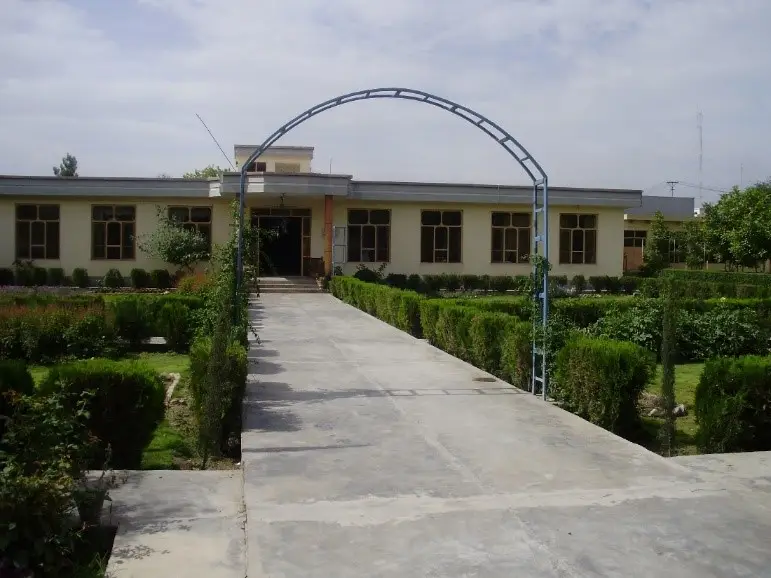
Photos of Mir Mohammad Youssof Vocational School Jalalabad
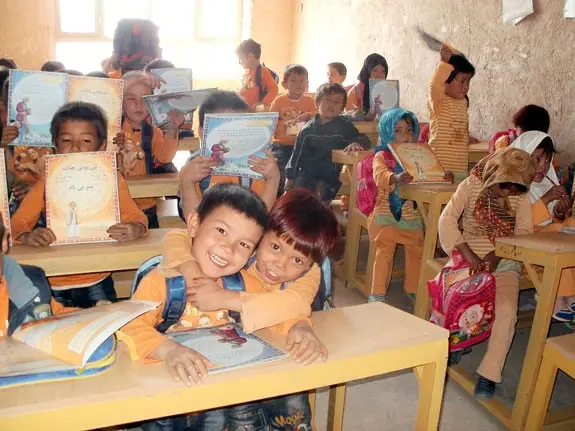
Photo of Hazara children at the Payam-e Danesh School in Herat receiving English and Farsi books published by Hoopoe Books of stories told by Idries Shah
When COVID -19 came to Afghanistan in April 2020 schools and other institutions and businesses were closed. The result was that Afghans that depended on their labor became unemployed and were not able to pay for food and other essentials. While schools were closed, IOC joined with other organizations to form a coalition named Afghan COVID-19 Relief to raise funds, purchase food and distribute food to families in most need.
The leaders of the Afghan COVID-19 Relief campaign decided to incorporate an organization named Afghanistan Relief Alliance ARA. The goal was to have an organization that would call on the resources of many organizations operating independently in Afghanistan to respond to natural disasters such as earthquakes, floods, and droughts. Funds were raised and humanitarian aid was distributed to victims of floods and extreme frigid winter storms. IOC was chosen to be the fiscal sponsor of Afghanistan Relief Alliance.
In May 2021 there was an attack on a high school for Hazara girls in Dasht-e Barchi in West Kabul. One hundred were killed and two hundred injured. IOC and ARA raised funds and provided financial aid to the families of the deceased victims and medical care for the survivors.
On November 2, 2021, three shooters attacked Kabul University killing thirty-two and wounding fifty. IOC collaborated with Afghan Student Associations at California universities and colleges to distribute funds the students raised to provide financial aid to the families of the deceased and medical care for the survivors.
In April 2022 just before schools were scheduled to open following Naw Roz the beginning of the New Year in Afghanistan, President Biden announced the withdrawal of all US troops from Afghanistan. Members of NATO and other nations announced they would also depart Afghanistan.
Because of the economic collapse in Afghanistan following the withdrawal of funding from the US government and other international donors, unemployment increased and hunger became pervasive. ARA started a fundraising campaign to provide food relief to families that are most in need.
ARA and IOC have distributed food to families in over 24 Provinces of Afghanistan. ARA anticipates completing food distributions in all 34 Provinces.
Distribution of food and responding to attacks on school children is not our core mission. We prefer to provide education that will enable youth to be productive and support their family and not be dependent on the generosity of others.
IOC responded to these man-made disasters because schools cannot operate when children and their families are hungry or when they are injured or sick.



